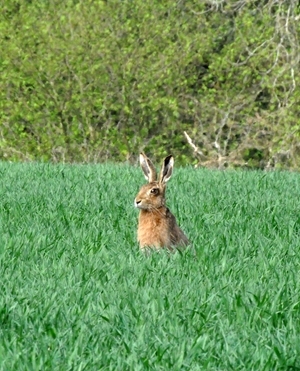 Scientists, politicians, conservationists and farmers will be debating the art of the possible to bring about a dramatic wildlife revival in the next six years at a specially convened research conference organised by the Game & Wildlife Conservation Trust on Tuesday 13th May at the Royal Geographical Society in London.
Scientists, politicians, conservationists and farmers will be debating the art of the possible to bring about a dramatic wildlife revival in the next six years at a specially convened research conference organised by the Game & Wildlife Conservation Trust on Tuesday 13th May at the Royal Geographical Society in London.
There is no doubt that the next round of CAP reform will present a new set of challenges for farmers and conservationists and it is likely that to bring about a change in the fortunes of wildlife in this country we will have to achieve far more for less.
The most recent report to study the status of wildlife in this country; “State of Nature” painted a depressing picture of wildlife and showed that 60% of the species studied have suffered declines over the last 50 years. An unavoidable conclusion of the report was that attempts over the last few decades to target declining and endangered species have failed.
However, as Professor Nick Sotherton, the GWCT’s director of research, says, “To make the next generation of agri-environment schemes work more effectively, we need to refine our research and its delivery to get a ‘bigger bang for our buck’! It is therefore vital that conservationists, politicians and scientists work collectively to achieve dramatic improvements in wildlife recovery.”
The GWCT’s research conference will present the results and highlights of more than 40 years of research and will show how this work to date has helped drive existing agri-environment schemes. But what more can be done?
Professor Sotherton explains, “Our research has been pivotal in developing innovative and workable solutions for reviving a range of wildlife such as wild grey partridges, brown hare and water voles. A key aspect of recovery will always be to get more people on the ground targeting recovery more accurately. Well-researched solutions are therefore key to this and an aim of our conference is to share successes, pin-point workable solutions and importantly identify how these can be delivered on the ground to help achieve rapidly approaching conservation targets.”
Richard Benyon MP, former environment minister, will officially open the conference with a keynote speech. Professor Sotherton says, “Richard Benyon is a passionate environmentalist and his personal insight on Government thinking and funding will prove invaluable.”
The conference fee is £45. For further information or to reserve a place, please visit the GWCT’s website: www.gwct.org.uk/revivalconference. The Conference organiser is: Lynn Field on 01425 651025 or email: lfield@gwct.org.uk
END
Photocaption: An inquisitive brown hare on the look-out for answers. The GWCT research conference hopes to provide them. Photo credit: Peter Thompson.
Notes to editors:
Programme Highlights:
Policy setting: the challenges facing Agri-Environment measures – Dr Alastair Leake, GWCT director of Policy
Cluster Farms: A new concept in landscape scale conservation - farmers working together. Peter Thompson, GWCT Farmland Biodiversity Advisor
Agri-Environment in the landscape. How can we do it better? John Holland , GWCT, Farmland Ecology
Farmland Insect declines: Climate change or intensive management. More mitigation needed. Dr Julie Ewald, GIS studies
Wader recovery in the Avon Valley; creating more for less. Dr Andrew Hoodless, GWCT wetland research.
Marlborough Downs Nature Improvement Areas – farmers show they deliver. Chris Musgrave - insight from a practitioner.
The Game & Wildlife Conservation Trust (GWCT) – providing research-led conservation for a thriving countryside. The GWCT is an independent wildlife conservation charity which has carried out scientific research into Britain’s game and wildlife since the 1930s. We advise farmers and landowners on improving wildlife habitats and we lobby for agricultural and conservation policies based on science. We employ 14 post-doctoral scientists and 50 other research staff with expertise in areas such as birds, insects, mammals, farming, fish and statistics. We undertake our own research as well as projects funded by contract and grant-aid from Government and private bodies. The Trust is also responsible for a number of Government Biodiversity Action Plan species and is lead partner for grey partridge and joint lead partner for brown hare and black grouse. For Information, contact: Morag Walker – Head of Media, Telephone – direct-dial: 01425-651000. Mobile – 07736-124097 www.gwct.org.uk